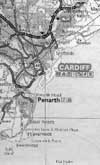|

Read
about
Real Cardiff
Broadway
Bute Street
Charles Street
City Road
Flat Holm
The Four Elms
The Garth
Gorsedd Gardens
Hadfield Road
Kardomah
Lloyd George Ave
Mount Stuart Square
Newport Road
Newtown
The Parks of Roath
The Pearl
Whitchurch
Common
Womanby St.
Cardiff
Poets Map
Cardiff,
New York
Shots
of the Bay
and the City
More
Scenes
Cardiff
Fictions and
Creative
autobiographies
Poems
Hamadryad Park
Ely
The Bay
St David's Hall
The Museum
Lambies
The City
Check Your Accent
Ffynnon Denis
back
to Cardiff
back
to site map
|
At a point roughly half way between the Julian Hodge Building,
Cardiff's first high-rise, and The Royal Oak, the pub with the boxing
gym on its second floor and a bar full of Jim Driscol memorabilia, lies
Elm Street. This unprepossessing terrace of workers housing put up at
the end of the last century is one of the few places in Cardiff where
the grey light of South Wales has been ignored. The residents have painted
the render on their frontages in Mediterranean technicolour. Greek orange,
crab pink, sky blue, dust avocado, Italian cream, tooth-pick red. No
sludge, not a sign of mould, the windowsills are full of flower boxes,
hanging tubs and ceramic butterflies. The street has seen innovation
before. When the poet and architect Ifor Thomas lived here he installed
sunken baths, moved doors and rebuilt walls. But you had to take care,
this was old Cardiff. Press hard, he told me, and you could push your
hand through the plaster right into next door.
There once were elms here. Four of them, shown on the OS maps of
1789, growing roughly where Lower Clifton Street intersects with Broadway
(which was little more than a green lane then). There was a mile stone,
still there in 1969, gone now. The pub called after the trees, The
Four Elms, now gloriously renamed and repainted as The Yellow Kangaroo,
hosted a writers' gathering for a short time in its life. In a little-used
backroom which held the pub's water cistern and a collection aged
accoutrements belonging to the local Order of the Buffalo (a less
well financed, considerable less able and utterly less secret working-class
version of the Masons) writers would gather to exchange ideas, read
poems, criticise each other's work and drink. The beat writer, Gerald
Nicosia, visited here with his mother. You could tell that's who she
was because she wore a large lapel badge saying so. AUTHOR'S MOTHER.
She led the applause vigorously every time the great man spoke. Actually
Gerry fitted in well. He was short, Italian looking, and displayed
a tenacious enthusiasm for his own work that recalled Tony Curtis.
He'd written Memory Babe, a critical biography of Jack Kerouac
for Penguin and was on a roll. What he was now doing in the back streets
of Cardiff, mom in tow, talking to a bunch of wannabes, some of whom
didn't even own typewriters was anyone's guess. Gerry read his own
verse, faux-beat stuff, thick with bohemian allusion and then dipped
into his Kerouac to tell us about Denver, Jack and Neil and Carolyn
and Allen and make us all want to go straight out and shove a few
benzedrine inhalers down our throats and stay up all nite. He had
to stop every now and then as drinkers in the bar below us used the
gents. This made the cistern to flush eagerly. We cheered. Mom had
a great time. She'd never been to Wales before and was now convinced
that we were as literary a bunch as her son's cohorts in Chicago.
Outside Welsh rain rattled the windows. Someone filled a missing pane
with a plastic bag. Gerry did not have any copies of his books with
him for resale. A refreshing sign of literary don't care or one of
earlier success? Who knows. Shortly after that the pub went up-market
installing satellite tv and pumping non-stop sports into every drinking
nook and beer consuming cranny. Half the pubs in Cardiff were doing
the same. The Frog and Toad, The Duck and Donkey, The Useless Lettuce,
The Newt and Corkscrew, The Pissed Potato. The writers moved on. The
world of poetry, beatniks, and buffalo would never be quite the same.
Peter Finch

back to the top
|
The
Four
Elms

|
|